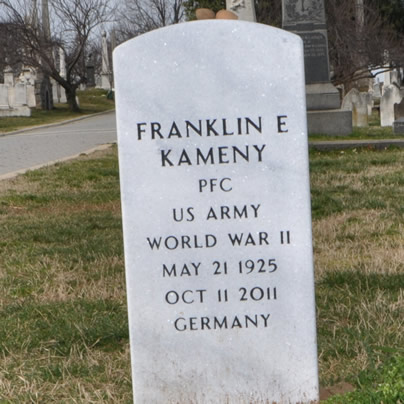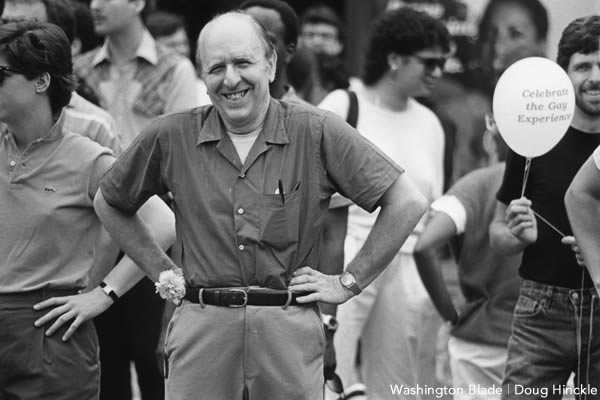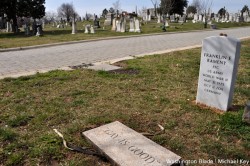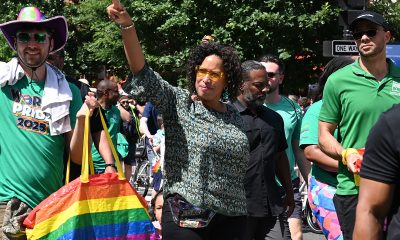Local
1 year later, Kameny’s ashes still not buried
Dispute over burial site remains unresolved


Pioneering gay rights activist, Frank Kameny died on Oct. 11, 2011, which happens to be National Coming Out Day. (Washington Blade photo by Doug Hinckle)
One year after gay rights pioneer Frank Kameny’s death in his Washington home at the age of 86, LGBT advocates said they would remember his legacy as they celebrate National Coming Out Day this week.
Kameny died of natural causes on Oct. 11, 2011, the day LGBT advocates have designated as National Coming Out Day.
His friends and admirers, while saddened by his loss, said it was befitting that Kameny departed on a day commemorating an action he may have been among the first to take part in in the late 1950s — a proud and open declaration that one is gay, lesbian, bisexual or transgender.
“His accomplishments for our community are immeasurable,” said veteran D.C. gay activist Paul Kuntzler
Kuntzler spoke to the Blade about Kameny during a candidate endorsement forum Tuesday night sponsored by the Gertrude Stein Democratic Club, an LGBT organization that Kuntzler and Kameny helped found in January 1976.
But Kuntzler and others who worked with Kameny said they remain troubled that an ongoing dispute between Timothy Clark, the heir and personal representative to Kameny’s estate, and the D.C. gay charitable group Helping Our Brothers and Sisters (HOBS) has resulted in the indefinite postponement of the burial of Kameny’s ashes.

A headstone once marked the the spot where advocates intended gay activist Frank Kameny to be buried, but legal action has halted the interment and the headstone has been removed. (Washington Blade file photo by Michael Key)
In August, an official with D.C.’s historic Congressional Cemetery, where Kameny’s ashes were to be buried, said an urn bearing the ashes remained in a storage vault at the cemetery’s headquarters near Capitol Hill while the estate dispute dragged on.
When asked if the ashes were still in storage at the cemetery, Congressional Cemetery President Paul Williams told the Blade on Wednesday, “There has been no substantial change in the case. That’s all I’m going to say.”
Both sides acknowledge that the dispute is over a disagreement about how to transfer the ownership of the cemetery plot from HOBS, which bought it earlier this year, to the Kameny estate, which is under the control of Clark.
HOBS executive director Marvin Carter has said HOBS is willing to sell the plot to the estate at the price the group paid for it earlier this year. The estate, through one of its attorneys, Glen Ackerman, has said HOBS bought the plot through donations from members of the LGBT community who knew and admired Kameny and that HOBS should transfer the title to the plot to the estate.
Earlier this year, Ackerman said Clark was troubled that some of Kameny’s longtime friends worked with HOBS to buy the plot and make arrangements for the burial without consulting Clark, who has legal authority over the ashes. Ackerman said then that Clark was concerned that HOBS might seek to bury others in the plot along with Kameny’s ashes since the plot can accommodate at least two coffins and three urns.
HOBS has said it has no intention of burying anyone else in the plot.
“The estate of Franklin Kameny is currently in negotiations in an effort to settle outstanding matters related to the estate,” Ackerman said in a statement released on Tuesday. “We cannot comment on these negotiations or the status of the various matters as doing so may compromise the progress that has been made thus far,” he said. “All involved are hopeful that resolution may be reached in the near future.”
“HOBS is working diligently and in good faith to resolve all issues concerning the plot at Congressional Cemetery and the final burial of Frank’s ashes at the Cemetery in a manner and under circumstances that will protect and advance Frank’s reputation in and contributions to the LGBT community,” Carter said in a statement issued to the Blade.
Records in the D.C. Superior Court’s civil division, where the Kameny estate case remains pending, show that at least one creditor filed suit against the estate on Aug. 7 to challenge a decision by the estate to reject the creditor’s request for repayment of a $12,000 loan and $3,075 of accrued interest on the loan for a total of $15,075.
The suit says the loan was made by D.C. gay activist and longtime Kameny friend Craig Howell in two increments in 2003 and 2004, according to Mindy Daniels, Howell’s attorney.
Court papers filed by the estate challenge the legal authority of Howell’s claim for the loan repayment on several grounds, saying, among other things, that Howell waived a requirement that Kameny make interest payments on the loan prior to Kameny’s death.
The Human Rights Campaign, a national LGBT political group that organizes Coming Out Day activities, included a remembrance of Kameny on its website this week.
“One year ago, the LGBT community lost equality pioneer Frank Kameny, a man whose tireless activism blazed a trail for the entire LGBT community,” the HRC web posting says. “This National Coming Out Day, we remember Frank Kameny by honoring his legacy as a forerunner of the modern LGBT rights movement.”
Kameny, a D.C. resident since the 1950s, is credited with playing a key role in laying the foundation for the modern gay rights movement beginning in the early 1960s, nearly a decade before the 1969 Stonewall riots in New York’s Greenwich Village.
He began his fight for LGBT equality in 1957 after being fired for being gay from his job as an astronomer at the U.S. Army Map Service. After losing administrative and lower court appeals, Kameny took his case to the U.S. Supreme Court, where he wrote his own petition urging the high court to hear the case in 1961.
The Supreme Court denied his petition and left standing a lower court ruling upholding his firing. But LGBT advocates and historians have said Kameny’s petition, or brief, filed with the high court represented the first known time anyone submitted an unapologetic and legally reasoned argument before a court of law in support of equal rights for gay people in the United States.
A short time later, Kameny co-founded the Mattachine Society of Washington, the city’s first gay rights organization. Although Mattachine Society groups had formed in other cities beginning in the 1950s, the D.C. group under Kameny’s leadership took on a far more assertive posture in pushing for gay equality, laying the groundwork for the post-Stonewall Riots LGBT rights movement in the years ahead, according to author David Carter, who is currently writing a Kameny biography.
District of Columbia
Capital Pride wins anti-stalking order against local activist
Darren Pasha claims action is linked to his criticism of Pride organizers

A D.C. Superior Court judge on Feb. 6 partially approved an anti-stalking order against a local LGBTQ activist requested last October by the Capital Pride Alliance, the D.C.-based LGBTQ group that organizes the city’s annual Pride events.
The ruling by Judge Robert D. Okun requires former Capital Pride volunteer Darren Pasha to stay at least 100 feet away from Capital Pride’s staff, board members, and volunteers until the time of a follow up court hearing he scheduled for April 17.
In his ruling at the Feb. 6 hearing, which was virtual rather than held in-person at the courthouse, Okun said he had changed the distance that Capital Pride had requested for the stay-away, anti-stalking order from 200 yards to 100 feet. The court records show that the judge also denied a motion filed earlier by Pasha, who did not attend the hearing, to “quash” the Capital Pride civil case against him.
Pasha told the Washington Blade he suffered an injury and damaged his mobile phone by falling off his scooter on the city’s snow-covered streets that prevented him from calling in to join the Feb. 6 court hearing.
In his own court filings without retaining an attorney, Pasha has strongly denied the stalking related allegations against him by Capital Pride, saying “no credible or admissible evidence has been provided” to show he engaged in any wrongdoing.
The Capital Pride complaint initially filed in court on Oct. 27, 2025, includes an 18-page legal brief outlining its allegations against Pasha and an additional 167-page addendum of “supporting exhibits” that includes multiple statements by witnesses whose names are blacked out.
“Over the past year, Defendant Darren Pasha (“DSP”) has engaged in a sustained, and escalating course of conduct directed at CPA, including repeated and unwanted contact, harassment, intimidation, threats, manipulation, and coercive behavior targeting CPA staff, board members, volunteers, and affiliates,” the Capital Pride complaint states.
In his initial 16-page response to the complaint, Pasha says the Capital Pride complaint appears to be a form of retaliation against him for a dispute he has had with the organization and its then president, Ashley Smith, last year.
“It is evident that the document is replete with false, misleading, and unsubstantiated assertions,” he said of the complaint.
Smith, who has since resigned from his role as board president, did not respond to a request by the Blade for comment at the time the Capital Pride court complaint was filed against Pasha.
Capital Pride Executive Director Ryan Bos and the attorney representing the group in its legal action against Pasha, Nick Harrison, did not immediately respond to a Blade request for comment on the judge’s Feb. 6 ruling.

The Comings & Goings column is about sharing the professional successes of our community. We want to recognize those landing new jobs, new clients for their business, joining boards of organizations and other achievements. Please share your successes with us at [email protected].
The Comings & Goings column also invites LGBTQ+ college students to share their successes with us. If you have been elected to a student government position, gotten an exciting internship, or are graduating and beginning your career with a great job, let us know so we can share your success.
Congratulations to David Reid on his new position as Principal, Public Policy, with Brownstein Hyatt Farber Schreck. Upon being named to the position, he said, “I am proud to be part of this inaugural group of principals as the firm launches it new ‘principal, public policy’ title.”
Reid is a political strategist and operative. He is a prolific fundraiser, and skilled advocate for legislative and appropriations goals. He is deeply embedded in Democratic politics, drawing on his personal network on the Hill, in governors’ administrations, and throughout the business community, to build coalitions that drive policy successes for clients. His work includes leading complex public policy efforts related to infrastructure, hospitality, gaming, health care, technology, telecommunications, and arts and entertainment.
Reid has extensive political finance experience. He leads Brownstein’s bipartisan political operation each cycle with Republican and Democratic congressional and national campaign committees and candidates. Reid is an active member of Brownstein’s pro-bono committee and co-leads the firm’s LGBT+ Employee Resource Group.
He serves as a Deputy National Finance Chair of the Democratic National Committee and is a member of the Finance Committee of the Democratic Governors Association, where he previously served as the Deputy Finance Director.
Prior to joining Brownstein, Reid served as the Washington D.C. and PAC finance director at Hillary for America. He worked as the mid-Atlantic finance director, for the Democratic Senatorial Campaign Committee and ran the political finance operation of a Fortune 50 global health care company.
Among his many outside involvements, Reid serves on the executive committee of the One Victory, and LGBTQ Victory Institute board, the governing bodies of the LGBTQ Victory Fund and Institute; and is a member of the board for Q Street.
Congratulations also to Yesenia Alvarado Henninger of Helion Energy, president; Abigail Harris of Honeywell; Alex Catanese of American Bankers Association; Stu Malec, secretary; Brendan Neal, treasurer; Brownstein’s David Reid; Amazon’s Suzanne Beall; Lowe’s’ Rob Curis; andCornerstone’s Christian Walker. Their positions have now been confirmed by the Q Street Board of Directors.
District of Columbia
D.C. pays $500,000 to settle lawsuit brought by gay Corrections Dept. employee
Alleged years of verbal harassment, slurs, intimidation

The D.C. government on Feb. 5 agreed to pay $500,000 to a gay D.C. Department of Corrections officer as a settlement to a lawsuit the officer filed in 2021 alleging he was subjected to years of discrimination at his job because of his sexual orientation, according to a statement released by the American Civil Liberties Union of D.C.
The statement says the lawsuit, filed on behalf of Sgt. Deon Jones by the ACLU of D.C. and the law firm WilmerHale, alleged that the Department of Corrections, including supervisors and co-workers, “subjected Sgt. Jones to discrimination, retaliation, and a hostile work environment because of his identity as a gay man, in violation of the D.C. Human Rights Act.”
Daniel Gleick, a spokesperson for D.C. Mayor Muriel Bowser, said the mayor’s office would have no comment on the lawsuit settlement. The Washington Blade couldn’t immediately reach a spokesperson for the Office of the D.C. Attorney General, which represents the city against lawsuits.
Bowser and her high-level D.C. government appointees, including Japer Bowles, director of the Mayor’s Office of LGBTQ Affairs, have spoken out against LGBTQ-related discrimination.
“Jones, now a 28-year veteran of the Department and nearing retirement, faced years of verbal abuse and harassment from coworkers and incarcerated people alike, including anti-gay slurs, threats, and degrading treatment,” the ACLU’s statement says.
“The prolonged mistreatment took a severe toll on Jones’s mental health, and he experienced depression, Post-Traumatic Stress Disorder, and 15 anxiety attacks in 2021 alone,” it says.
“For years, I showed up to do my job with professionalism and pride, only to be targeted because of who I am,” Jones says in the ACLU statement. “This settlement affirms that my pain mattered – and that creating hostile workplaces has real consequences,” he said.
He added, “For anyone who is LGBTQ or living with a disability and facing workplace discrimination or retaliation, know this: you are not powerless. You have rights. And when you stand up, you can achieve justice.”
The settlement agreement, a link to which the ACLU provided in its statement announcing the settlement, states that plaintiff Jones agrees, among other things, that “neither the Parties’ agreement, nor the District’s offer to settle the case, shall in any way be construed as an admission by the District that it or any of its current or former employees, acted wrongfully with respect to Plaintiff or any other person, or that Plaintiff has any rights.”
Scott Michelman, the D.C. ACLU’s legal director said that type of disclaimer is typical for parties that agree to settle a lawsuit like this.
“But actions speak louder than words,” he told the Blade. “The fact that they are paying our client a half million dollars for the pervasive and really brutal harassment that he suffered on the basis of his identity for years is much more telling than their disclaimer itself,” he said.
The settlement agreement also says Jones would be required, as a condition for accepting the agreement, to resign permanently from his job at the Department of Corrections. ACLU spokesperson Andy Hoover said Jones has been on administrative leave since March 2022. Jones couldn’t immediately be reached for comment.
“This is really something that makes sense on both sides,” Michelman said of the resignation requirements. “The environment had become so toxic the way he had been treated on multiple levels made it difficult to see how he could return to work there.”
-

 Colombia5 days ago
Colombia5 days agoLGBTQ Venezuelans in Colombia uncertain about homeland’s future
-

 District of Columbia5 days ago
District of Columbia5 days agoD.C. bar Rush facing eviction on charge of failing to pay rent
-

 Sports5 days ago
Sports5 days agoBlade, Pride House LA announce 2028 Olympics partnership
-

 District of Columbia5 days ago
District of Columbia5 days agoD.C. non-profits find creative ways to aid the unhoused amid funding cuts



















